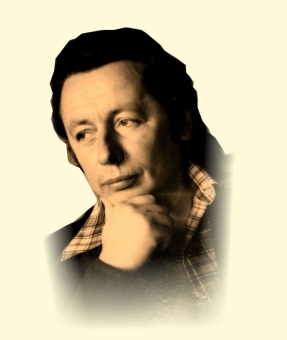Yaroslav Doroshenko

YAROSLAV DOROSHENKO
He loved the autumn - with miracle patterns of Indian summer webs, with sad variety of golden leaves shades.
Leaves are the most beautiful and the most close to sunny colours at the end of their lives, before falling down from the branch to the ground.
Yaroslav Doroshenko was an optimistic person who loved life more than it loved him ... He lived for people, cherished the poetry for them, and gave them his love and friendship - freely, openly and unequivocally...
Sincere, kind and sadly smiling Yaroslav understood people well, he knew who is who in Ukraine, but he had a rare talent of forgiveness. Sometimes he forgave even those people who did not deserve it. But the poet thought otherwise, and it was his right - the right of poet, creator, patriot and PERSON. He was looking at everything from the height, from the height of his talent, his wisdom and his unprotected unselfishness.
One of his maturity poem collections, almost the final one, is called eloquently the “Gold cathedrals of Trees.” Yaroslav Doroshenko was erecting his cathedral during his all life.
Everything started in a surprising and unusual way. On the day when luxuriant autumn reached its peak – on October 16, 1931 in Tyaziv village in Galychyna the embroideress Magda (from the family of Prychaky) and her husband, the violinist, Yurii Doroshenko carted to the field to gather potatoes in the bags. And it happened that they returned home with their first son, princely named Yaroslav.
Slavko grew a curious, restless and dreamy boy who loved nature and reading books. He spent a lot of time with his grandfather Pylyp, a deacon in the village, who had a magnificent (for that time) library. Slavko liked long conversations with his uncle Mykola, who was a teacher. Doroshenko grew, burgeoned out into the poet, a Ukrainian patriot and a fighter, who as a schoolboy formed and led the nationalist youth organization under the Cossack pseudonym Gamaliia.
In the summer of 1950 he was arrested and sentenced to 25 years, deprived of civil rights for 5 years and his all property was confiscated. During the investigation he was accused of writing and distributing anti-Soviet poetry since 1947 and membership in Tyaziv OUN (Organization of Ukrainian Nationalists) since 1948.
He served his sentence in Vorkuta and worked on the widely known No. 29 Mine, where a rebellion broke out on August 1, 1953. But he miraculously survived in that massacre, besides he participated in underground activity organized by political prisoners. Yaroslav Doroshenko left us the fragments of his memories of those memorable events in the notes “Shadows of the Northern Light”. Those notes recorded the flashes of memory, sparingly fixing his memories of the past.
After Khrushchev’s warming, which reached the Arctic too, Doroshenko was brought to Stanislaviv for further investigation. On September 30, 1955 he was released from custody for the lack of evidence of his conviction. In 1992 he was rehabilitated. In 1968 Yaroslav Doroshenko graduated from the Historical and Philological Faculty of Ivano-Frankivsk Pedagogical Institute named after V. Stefanyk.
For six years he worked in editorial offices of regional newspapers, was admitted to the Union of Journalists of Ukraine, worked in the Regional Literary Union, and presented his own poetry, reviews of art books. He was a senior editor of the Methodology Department of the Regional Administration of provision of film-showing facilities. During the 1988-90 he was a corresponding organizer of Bureau of Ukrainian literature information in our region.
Yaroslav Doroshenko is the author of poetry collections “Sunrise colours” (1972), “The persistence” (1979), “Thirst” (1984), “The Oars of Time” (1994), “The Sun in a Tear” (1995), “Gold Cathedrals of Trees” (2001), for children “The Cheerful Child” (2001), poems in magazines, books and periodicals. He wrote articles, reviews, prefaces for fictional books, collected stories and anthologies. A number of poems became songs.
From June 1990 to 2003 Yaroslav Doroshenko headed the Ivano-Frankivsk National Writers` Union of Ukraine. The number of members of the Union doubled when he was the head of it. He tirelessly cared about his fellow writers: helped them to get flats, contributed to publication of their books, wrote prefaces, reviews, and edited their manuscripts. He took care of everyone. And it all seemed so mundane, seemingly insignificant ... And how many writers began their activity with his good and sincere parental blessing! They probably no longer remember about it. And it was not long ago... Doroshenko initiated and revived the journal “Pereval” (ukrainian: перевал, the mountain pass). He was working on it after handing over the position of the head of the Ivano-Frankivsk National Writers` Union of Ukraine to his younger colleague. Yaroslav Doroshenko spent his last day in this world in editorial office of “Pereval”.
Yaroslav Doroshenko – a board member of the National Writers` Union of Ukraine, a member of the regional association of Taras Shevchenko Prosvita Ukrainian Society, a member of editorial boards of “Pereval” and “Dzvinochok” (ukrainian: дзвіночок, the bell ).
Slavko was intelligent and modest; he neither cared about himself nor reminded of rewards for him.
But speaking officially it should be mentioned that Doroshenko was admitted to the Journalists Union in 1969, and in 1982 he became a member of the National Writers` Union of Ukraine.
He was rewarded with the Honour of the National Writers` Union of Ukraine, the educational Medal “The Builder of Ukraine.”
Yaroslav Doroshenko is the laureate of Taras Melnychuk Literary Award, Ukrainian Arkadiia Literary Award and Maria Pidgyrianka Literary Award.
He passed into eternity on March 20, 2007.
With love, Anna Doroshenko
board_info
Address: 27 Snizhna str.
date: Tuesday, 7 October 2014



